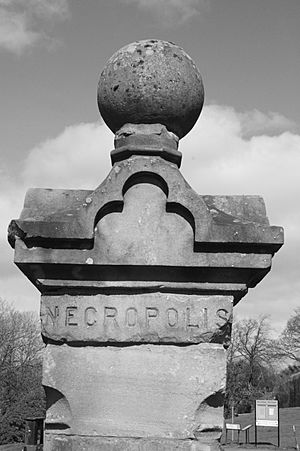Necropolis facts for kids
A necropolis is like a special, very large cemetery. The word comes from Ancient Greek and literally means "city of the dead." These places were often designed with grand monuments and tombs.
Unlike small graveyards or tombs found inside old cities, necropoleis were usually built a bit away from the main city. They are also different from simple grave fields, which didn't have big structures above the ground. While the term "necropolis" is often used for ancient sites, it was also used again in the 1800s for new, planned city cemeteries, like the Glasgow Necropolis in Scotland.
Contents
What is a Necropolis?
A necropolis is a large area set aside for burying the dead. Think of it as a planned community, but for tombs and monuments. These sites were often very important to ancient cultures. They showed respect for the dead and sometimes even displayed the wealth or power of families.
Why Were They Built Outside Cities?
In many ancient times, people believed it was important to keep burial sites separate from where the living resided. This was for several reasons. Sometimes it was about hygiene, to prevent diseases from spreading. Other times, it was for religious or spiritual beliefs. It also allowed for more space to create elaborate tombs and monuments.
Ancient Cities of the Dead
Many famous ancient civilizations built impressive necropoleis. These sites often give us clues about how people lived and what they believed. They can be filled with amazing art, architecture, and historical treasures.
Thebes, Egypt
One of the most famous ancient necropoleis is found near Thebes, Egypt. This area includes the famous Valley of the Kings. Here, pharaohs and powerful nobles were buried in hidden, rock-cut tombs. These tombs were often decorated with colorful paintings and hieroglyphs. They were meant to protect the mummies and treasures for eternity.
Etruscan Necropoleis
The Etruscans, an ancient people who lived in Italy before the Romans, also built incredible necropoleis. Places like Cerveteri have large, round tombs called tumuli. These look like small hills from the outside. Inside, they are carved to look like houses, complete with rooms and furniture. This shows how the Etruscans believed the afterlife was similar to daily life.
Modern Necropoleis
The idea of a "necropolis" was brought back in the 19th century. As cities grew, there was a need for larger, more organized cemeteries. These new necropoleis were often beautifully landscaped. They became peaceful parks where people could visit and remember their loved ones.
Glasgow Necropolis
The Glasgow Necropolis in Scotland is a great example of a modern necropolis. It was opened in 1833. It is designed like a park, with many grand monuments and statues. It sits on a hill overlooking Glasgow Cathedral. This site became a model for other large cemeteries built during that time.
Images for kids
-
Mastabas in the Giza Necropolis with the Pyramid of Khafre in the background
-
Entrances to rock-cut tombs in the Valley of the Kings in the Theban Necropolis
-
Naqsh-e Rustam. The order of the tombs in Naqshe-e Rustam, from left to right is: Darius II, Artaxerxes I, Darius I, Xerxes I.
See also
 In Spanish: Necrópolis para niños
In Spanish: Necrópolis para niños
 | Georgia Louise Harris Brown |
 | Julian Abele |
 | Norma Merrick Sklarek |
 | William Sidney Pittman |





